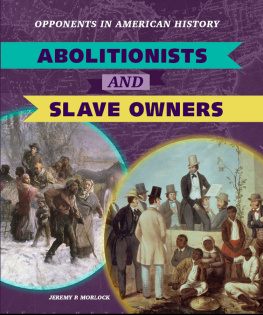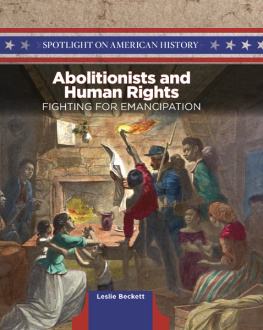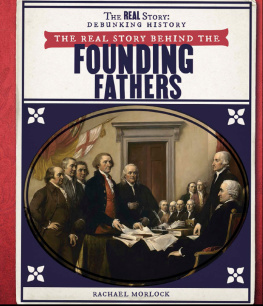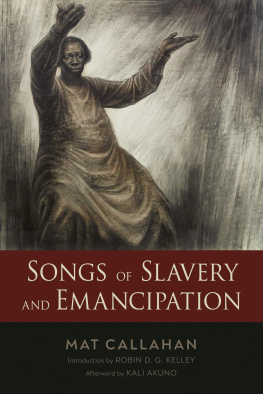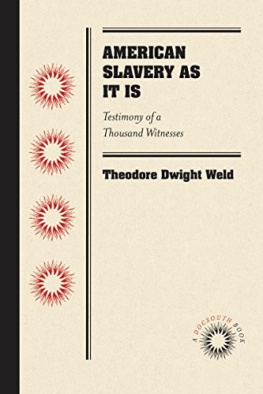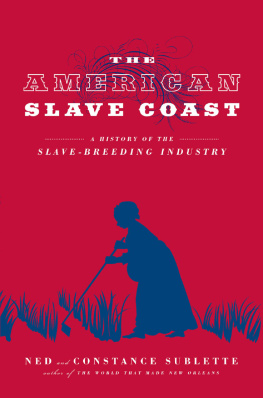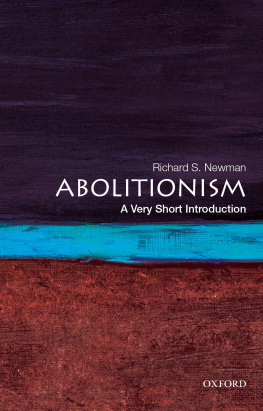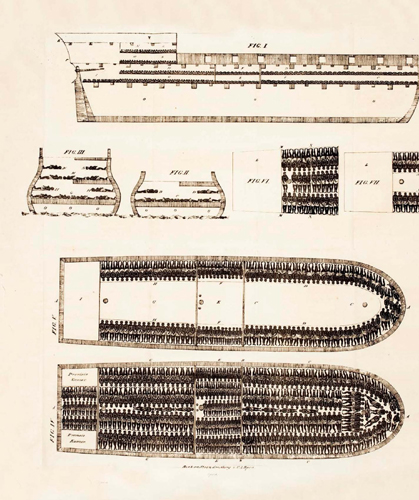Contents
Published in 2020 by The Rosen Publishing Group, Inc. 29 East 21st Street, New York, NY 10010
Copyright 2020 by The Rosen Publishing Group, Inc.
All rights reserved. No part of this book may be reproduced in any form without permission in writing from the publisher, except by a reviewer.
First Edition
Editor: Jane Katirgis
Book Design: Tanya Dellaccio
Photo Credits: Cover (left) SuperStock/Getty Images; cover (right) DEA PICTURE LIBRARY/De Agostini Picture Library/Getty Images; p. 5 (main) https://upload.wikimedia.org/wikipedia/commons/d/d6/Writing_the_Declaration_of_Independence_1776_cph.3g09904.jpg; p. 5 (inset) https://upload.wikimedia.org/wikipedia/commons/8/8f/United_States_Declaration_of_Independence.jpg; p. 7 https://upload.wikimedia.org/wikipedia/commons/8/80/Official_medallion_of_the_British_AntiSlavery_Society_%281795%29.jpg; p. 9 https://upload.wikimedia.org/wikipedia/commons/f/ff/Thomas-Clarkson-De-kreet-der-Afrikanen_MG_1315.tif; p. 11 (Mum Bett) https://upload.wikimedia.org/wikipedia/commons/2/28/Mumbett70.jpg; p. 11 (William Cushing) Kean Collection/Archive Photos/ Getty Images; p. 13 (Benjamin Franklin) https://upload.wikimedia.org/wikipedia/commons/2/25/Benjamin_Franklin_by_Joseph_Duplessis_1778.jpg; p. 13 (Anthony Benezet) https://upload.wikimedia.org/wikipedia/commons/7/77/Benezet.jpg; pp. 15, 29 (portrait of slaves) Courtesy of the Library of Congress; p. 17 (massacre in Virginia) https://upload.wikimedia.org/wikipedia/commons/9/93/Nat_Turner_woodcut.jpg; p. 17 (William Lloyd Garrison) https://en.wikipedia.org/wiki/William_Lloyd_Garrison#/media/File%20William_Lloyd_Garrison_by_Southworth_and_Hawes,_c1850.png;p. 19 (John Calhoun) https://upload.wikimedia.org/wikipedia/commons/6/6e/George_Peter_Alexander_Healy_-_John_C._Calhoun_-_Google_Art_Project.jpg; pp. 19 (Alton riot), 23 (Frederick Douglass), 27 (slave image) Hulton Archive/Getty Images; p. 21 (Sojourner Truth) Bettmann/Getty Images; p. 23 (Dred Scott) https://upload.wikimedia.org/wikipedia/commons/9/97/DredScott.jpg; p. 25 Everett Historical/Shutterstock. com; p. 27 (Uncle Toms Cabin cover) https://upload.wikimedia.org/wikipedia/commons/3/31/UncleTomsCabinCover.jpg; p. 29 (Abraham Lincoln) https://upload.wikimedia.org/wikipedia/commons/a/ab/Abraham_Lincoln_O-77_matte_collodion_print.jpg.
Cataloging-in-Publication Data
Title: Abolitionists and slave owners / Jeremy P. Morlock.
Description: New York : PowerKids Press, 2019. | Series: Opponents in American history | Includes glossary and index.
Identifiers: ISBN 9781538345382 (pbk.) | ISBN 9781538343661 (library bound) | ISBN 9781538345399 (6 pack)
Subjects: LCSH: Abolitionists--United States--History--19th century--Juvenile literature. | Antislavery movements--United States--History--19th century--Juvenile literature. | Slaves--Emancipation--United States--Juvenile literature. | African Americans--History--To 1863--Juvenile literature.
Classification: LCC E449.M675 2019 | DDC 973.7114--dc23
Manufactured in the United States of America
CPSIA Compliance Information: Batch #CSPK19Franklin Gothic",serif">. For Further Information contact Rosen Publishing, New York, New York at 1-800-237-9932
CREATED EQUAL
The Declaration of Independence says, We hold these truths to be self-evident, that all men are created equal, that they are endowed by their Creator with certain unalienable Rights, that among these are Life, Liberty and the pursuit of Happiness. However, the colonies making this declaration in 1776 didnt treat all people as equal or free.
The fight over American slavery began before the founding of the United States. Abolitionists wanted to abolish, or get rid of, slavery. They saw ownership of human beings as cruel and unfair. Slave owners saw slavery as important to keeping their way of life. The disagreement continued from the founding of the nation through the Civil War. During those years, millions of people labored, suffered, and died in slavery.
AN ABOMINABLE CRIME
Thomas Jefferson, the main author of the Declaration of Independence, called slavery an abom i nable crime but owned slaves. Jefferson helped stop the importing of slaves to Virginia. He wrote a plan for eventually freeing all slaves, but he freed only a few of his slaves when he died. Jefferson worried that slavery would tear the country apart. He said, Justice is in one scale, and self-preservation in the other.
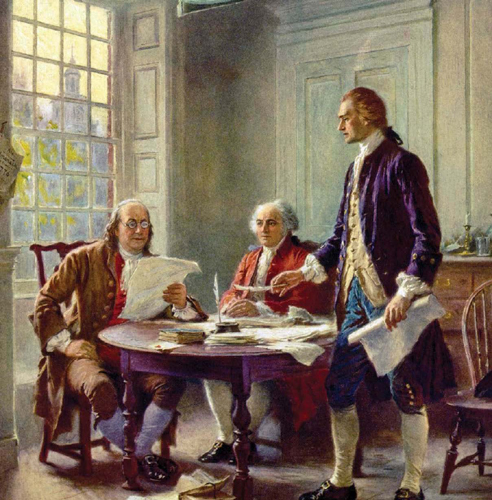
THOMAS JEFFERSON
THIS PAINTING, TITLED WRITING OF THE DECLARATION OF INDEPENDENCE, 1776, WAS PAINTED BY AMERICAN ARTIST JEAN LEON GEROME FERRIS .
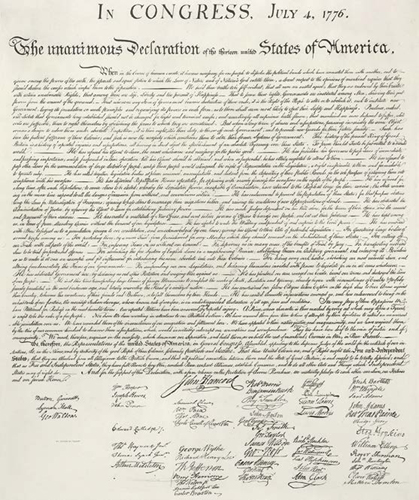
DECLARATION OF INDEPENDENCE
ABOLITIONISTS AND SLAVE OWNERS
Many abolitionists thought slavery was incompatible with American principles of freedom and equality. Some Christian abolitionists thought their faith required all people to be treated well. There were many differences among abolitionists on how to end slavery.
Some wanted to free slaves slowly over time. Some thought it would be best to pay slave owners to free slaves. White abolitionists often focused just on ending slavery. Many black abolitionists also fought for equal rights.Slave owners thought of slaves as their property. They said the government had no right to take away their property. They thought people from Africa were inferior to people from Europe and it was natural for one group to control another. They also said the Bible allowed slavery.
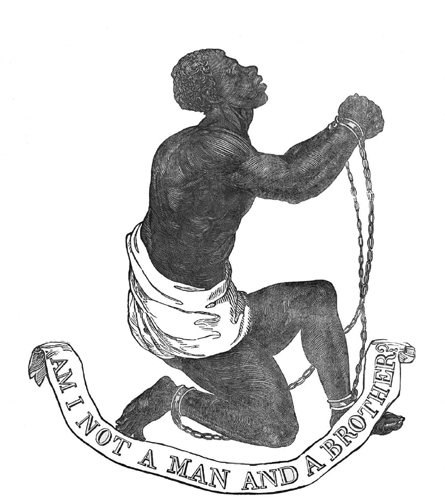
BRITISH AND AMERICAN ABOLITIONISTS USED THIS IMAGEOF AN AFRICAN MAN IN CHAINS TO SYMBOLIZE THE NEED TO END SLAVERY . ABOLITIONISTS USED PICTURES, POEMS, STORIES, AND SONGS TO SPREAD THEIR MESSAGES .
THE ATLANTIC SLAVE TRADE
From the early 16th century through the late 19th century, millions of people from Africa were kidnapped and sold to European slave traders. They were forced onto ships that crossed the Atlantic Ocean and then made to work as slaves in the Caribbean and the Americas.
European nations relied on imported African slave laborers to build and expand their colonies, including the British colonies that became the United States. The slave ships were crowded and unsafe. Many people died during the journey. Those who lived faced a difficult life of forced labor.
Many Europeans saw differences in skin color, features, and culture as signs that Africans were inferior. This made it easier for Europeans to say it was acceptable to make these other people into slaves.
HEAD TO HEAD
Abolitionist and former slave Ottobah Cugoano wrote about being taken into slavery: There was nothing to be heard but the rattling of chains, smacking of whips, and the groans and cries of our fellow-men.

